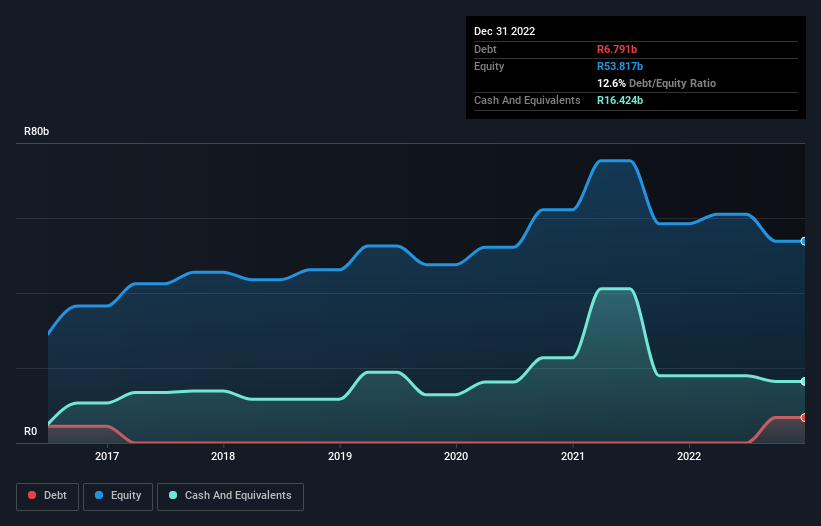
Legendary fund manager Li Lu (who Charlie Munger backed) once said, 'The biggest investment risk is not the volatility of prices, but whether you will suffer a permanent loss of capital.' When we think about how risky a company is, we always like to look at its use of debt, since debt overload can lead to ruin. We can see that Kumba Iron Ore Limited (JSE:KIO) does use debt in its business. But should shareholders be worried about its use of debt?
When Is Debt Dangerous?
Generally speaking, debt only becomes a real problem when a company can't easily pay it off, either by raising capital or with its own cash flow. Part and parcel of capitalism is the process of 'creative destruction' where failed businesses are mercilessly liquidated by their bankers. While that is not too common, we often do see indebted companies permanently diluting shareholders because lenders force them to raise capital at a distressed price. Of course, plenty of companies use debt to fund growth, without any negative consequences. The first step when considering a company's debt levels is to consider its cash and debt together.
Check out our latest analysis for Kumba Iron Ore
What Is Kumba Iron Ore's Net Debt?
You can click the graphic below for the historical numbers, but it shows that as of December 2022 Kumba Iron Ore had R6.79b of debt, an increase on none, over one year. However, its balance sheet shows it holds R16.4b in cash, so it actually has R9.63b net cash.

How Healthy Is Kumba Iron Ore's Balance Sheet?
According to the last reported balance sheet, Kumba Iron Ore had liabilities of R15.5b due within 12 months, and liabilities of R13.4b due beyond 12 months. On the other hand, it had cash of R16.4b and R5.92b worth of receivables due within a year. So it has liabilities totalling R6.50b more than its cash and near-term receivables, combined.
Of course, Kumba Iron Ore has a market capitalization of R143.4b, so these liabilities are probably manageable. Having said that, it's clear that we should continue to monitor its balance sheet, lest it change for the worse. While it does have liabilities worth noting, Kumba Iron Ore also has more cash than debt, so we're pretty confident it can manage its debt safely.
The modesty of its debt load may become crucial for Kumba Iron Ore if management cannot prevent a repeat of the 46% cut to EBIT over the last year. When it comes to paying off debt, falling earnings are no more useful than sugary sodas are for your health. There's no doubt that we learn most about debt from the balance sheet. But it is future earnings, more than anything, that will determine Kumba Iron Ore's ability to maintain a healthy balance sheet going forward. So if you're focused on the future you can check out this free report showing analyst profit forecasts.
Finally, a company can only pay off debt with cold hard cash, not accounting profits. While Kumba Iron Ore has net cash on its balance sheet, it's still worth taking a look at its ability to convert earnings before interest and tax (EBIT) to free cash flow, to help us understand how quickly it is building (or eroding) that cash balance. Over the most recent three years, Kumba Iron Ore recorded free cash flow worth 69% of its EBIT, which is around normal, given free cash flow excludes interest and tax. This free cash flow puts the company in a good position to pay down debt, when appropriate.
Summing Up
While it is always sensible to look at a company's total liabilities, it is very reassuring that Kumba Iron Ore has R9.63b in net cash. And it impressed us with free cash flow of R19b, being 69% of its EBIT. So we don't have any problem with Kumba Iron Ore's use of debt. When analysing debt levels, the balance sheet is the obvious place to start. However, not all investment risk resides within the balance sheet - far from it. Case in point: We've spotted 4 warning signs for Kumba Iron Ore you should be aware of, and 1 of them is significant.
When all is said and done, sometimes its easier to focus on companies that don't even need debt. Readers can access a list of growth stocks with zero net debt 100% free, right now.
If you're looking to trade Kumba Iron Ore, open an account with the lowest-cost platform trusted by professionals, Interactive Brokers.
With clients in over 200 countries and territories, and access to 160 markets, IBKR lets you trade stocks, options, futures, forex, bonds and funds from a single integrated account.
Enjoy no hidden fees, no account minimums, and FX conversion rates as low as 0.03%, far better than what most brokers offer.
Sponsored ContentValuation is complex, but we're here to simplify it.
Discover if Kumba Iron Ore might be undervalued or overvalued with our detailed analysis, featuring fair value estimates, potential risks, dividends, insider trades, and its financial condition.
Access Free AnalysisHave feedback on this article? Concerned about the content? Get in touch with us directly. Alternatively, email editorial-team (at) simplywallst.com.
This article by Simply Wall St is general in nature. We provide commentary based on historical data and analyst forecasts only using an unbiased methodology and our articles are not intended to be financial advice. It does not constitute a recommendation to buy or sell any stock, and does not take account of your objectives, or your financial situation. We aim to bring you long-term focused analysis driven by fundamental data. Note that our analysis may not factor in the latest price-sensitive company announcements or qualitative material. Simply Wall St has no position in any stocks mentioned.
About JSE:KIO
Kumba Iron Ore
Engages in the exploration, extraction, beneficiation, marketing, sale, and shipping of iron ore for the steel industry in South Africa.
Excellent balance sheet established dividend payer.


